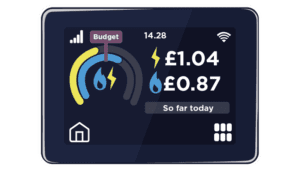
How can we reduce our carbon emissions related to housing consumption?
There are multiple options we can use to reduce our carbon footprint regarding housing energy. Please find here some advice we can all start doing already:

1) Consider installing a smart meter:
Smart meters offer a good way to monitor our energy consumption. We can see our consumption in real time and review historical data year after year.
We can also set thresholds to ensure our consumption doesn’t get too high. This helps give us a better understanding of our energy use at any time of the year.
Requesting a smart meter installation is not very difficult. By simply calling our energy provider, they can usually handle everything needed to replace our electrical and gas meters with smart meter-compatible ones. It is generally free of charge.
2) Switch our energy provider to a sustainable energy provider:
One of the most important steps we can take to reduce our carbon footprint is to switch to a sustainable energy provider. You can find a comparison list of providers on the consumer magazine website Which:
It is also possible to compare providers in Ethical Consumer magazine, which gives us a second opinion with a focus on providers that prioritize sustainability and efficiency.
egarding the amount of money we spend on energy every year, all our money is directly invested in wind turbine farms and solar fields that generate green energy with zero carbon footprint impact. The benefit is that there are very few side effects; We don’t notice any difference because the energy is simply green, with no carbon impact. If you think about it, there is little reason to wait before switching.

3) Housing heating: What options are available today?
When we examine our personal carbon emissions related to heating, one of the biggest sources of CO2 emissions comes from gas and fuel oil, as both fall under the fossil energy category.
Electric heating generates less CO2 overall because countries are increasingly mixing their energy production with renewable sources like solar panels and wind farms.
If we cannot switch from gas heating to electric heating, the carbon emitted depends on the consumption of our gas boiler. Newer models called condensing boilers are designed to be more sustainable than previous generations. They generate heat more efficiently by recovering heat from exhaust gases, which reduces energy consumption in the long run.
However, to make a bigger impact on reducing CO2 emissions, one of the best options is to switch from boiler heating to a heat pump.
In terms of price, heat pumps do not significantly change energy costs. In fact, in 2023, the total annual energy cost (the bill at the end of the year) was similar between heat pumps and gas boilers. The real benefit lies in the reduction of CO2 emissions: a heat pump can reduce our personal carbon footprint by up to 70% in housing, making it one of the best options available today.
Some energy providers already offer special programs to help us switch more easily to heat pumps. While these programs may not reduce the bill, they do help reduce our carbon footprint by 70%.
Please find more information at this Link:
Comments are closed